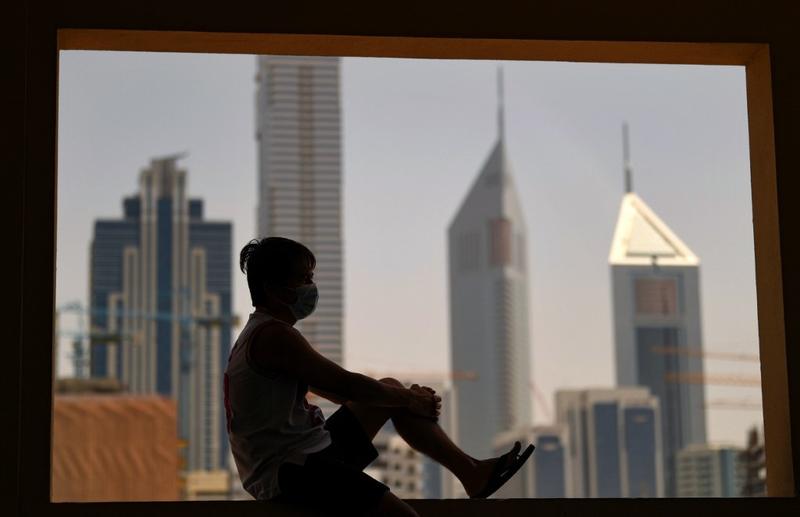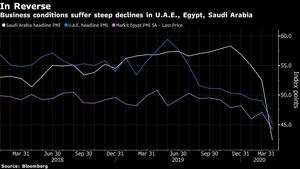 A man wearing a face mask gazes at the Dubai skyline from a window, during a lockdown imposed by the authorities in a bid to slow down the spread of novel coronavirus infection in the Emirati city on April 5, 2020. (KARIM SAHIB / AFP)
A man wearing a face mask gazes at the Dubai skyline from a window, during a lockdown imposed by the authorities in a bid to slow down the spread of novel coronavirus infection in the Emirati city on April 5, 2020. (KARIM SAHIB / AFP)
Three of the biggest Arab economies buckled in March after transportation seized up and hundreds of thousands of businesses shut down to slow the spread of the coronavirus.
Business conditions in the United Arab Emirates worsened at a record pace and dropped at the fastest in over a decade in Saudi Arabia after emergency steps were taken. Egypt’s non-oil private sector recorded its deepest contraction in over three years, according to reports released on Sunday.
IHS Markit’s gauge tracking operating conditions in Saudi Arabia’s non-oil private sector dropped below the threshold of 50 that separates growth from contraction for the first time since the survey began in August 2009, to 42.4. Its UAE Purchasing Managers’ Index fell to 45.2, the lowest ever. Egypt’s PMI slipped to 44.2 from 47.1 in February, retreating for an eighth month.
The non-oil economies of the energy-rich Gulf states are likely going in reverse this year, shrinking in the case of Saudi Arabia for the first time in more than three decades, after the one-two punch of collapsing crude prices and the health emergency.
Although the reports already laid bare the extent of economic damage in the Middle East, IHS Markit said its survey data for Saudi Arabia and Egypt were collected March 12-23. The pandemic has shown little sign of easing since.
READ MORE: Saudi Arabia pledges US$13.3b to cushion pvt sector from virus
Saudi Arabia, the UAE and Egypt have reported nearly 5,000 virus cases, with over 100 deaths in total. Businesses and travel across the region are in lockdown.

The Gulf’s commercial hub, Dubai, imposed further restrictions on the movement of people and halted metro services. A program to clean the streets will be extended to 24 hours for two weeks from Saturday, while supermarkets, pharmacies and food delivery services will continue operating.
Egypt’s government has curbed economic growth projections for the current and upcoming fiscal year to reflect the potential impact of the virus.
ALSO READ: Young Egyptians do their bit to help poor fight virus
Egyptian authorities have introduced a host of measures, including debt deferral for businesses and individuals, while the central bank last month cut the benchmark rate by 300 basis points.
The hope is that the emergency response will help stave off further pain for Egypt’s economy, which had been on course for revival as a result of an International Monetary Fund-backed economic program launched in 2016.


